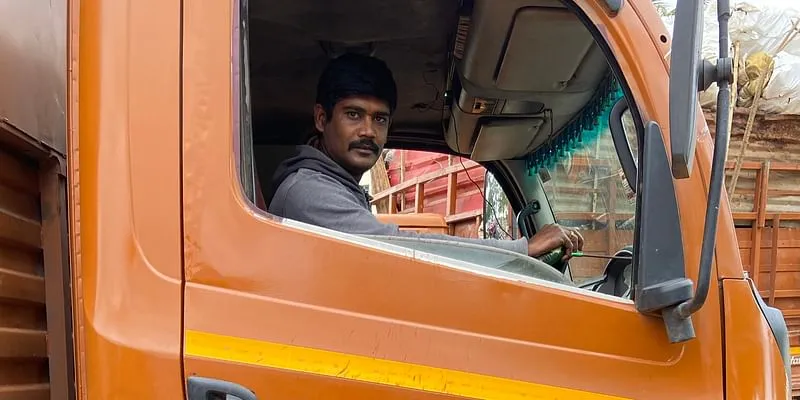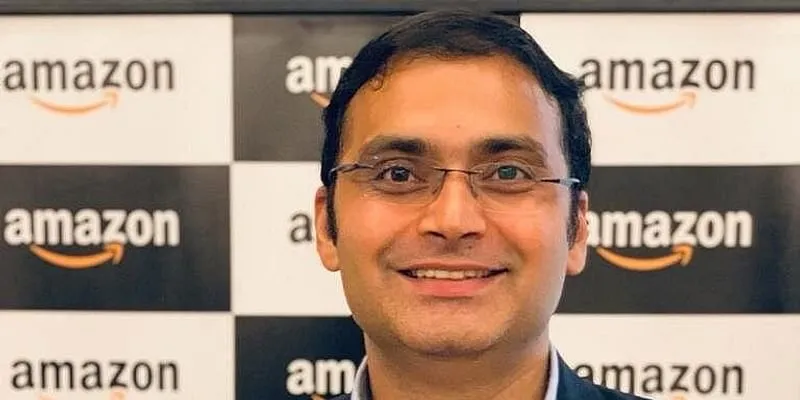These truck drivers became successful entrepreneurs by partnering with Amazon India
Amazon India’s trucking partners play an integral role in its middle-mile operations. Amazon Transportation Services, which is the logistics arm of the ecommerce major, makes entrepreneurship viable for its trucking partners.
Bengaluru-based Kiran Kumar Singh did not plan on becoming a truck driver. But in 2015, his father met with an accident while driving a truck and was hospitalised for three months. Kiran realised that it was up to him to shoulder the responsibility of providing for his family.
To mitigate the family’s immediate financial crisis, Kiran stepped into his father’s shoes and became a truck driver. It took him almost three months to learn how to professionally drive trucks. This decision to tide his family over the tough times led Kiran to build his passion for logistics entrepreneurship.
“I worked as a truck driver with Jayem Logistics, and utilised my hard-earned savings to purchase my first truck,” he tells SMBStory.
Through an acquaintance at Jayem Logistics, Kiran learnt about a requirement for a long-haul vehicle on one of the routes of Amazon India’s network. He enrolled as a partner and began operating the route, quickly orienting himself to Amazon’s operational guidelines.
He says spotted his diligence and the quality of service, and offered him more routes to operate across south India.
“In a span of under three years, I expanded my fleet. Now I run my middle-mile operations business called SDP Logistics, alongside my father, brother, and uncle. We have employed close to 40 truck drivers,” he says.

Kiran Kumar Singh
Truckers – a crucial part of the supply chain
Kiran’s entrepreneurial journey is one among several success stories made possible by Amazon Transportation Services, which is the logistics arm of the ecommerce major.
Amazon India’s supply chain network is complex, and includes multiple nodes such as fulfilment centres, sorting locations, delivery hubs, and the last-mile transit for delivering goods. These elements have to work in sync to ensure the right product is delivered to the correct address.
When the ecommerce company entered India in 2013, it noticed that sellers did not have a reliable and robust logistics network. And so, it began creating such a network, partnering with local companies and small businesses to help transport packages.
Amazon has since grown rapidly in India on the back of its logistics network, and its trucking partners play an integral role in the middle-mile operations, enabling it to quickly transport packages between fulfilment centres and the last mile.
Abhinav Singh, Director, Amazon Transportation Services, India, says:
“Trucking partners play a pivotal role in ensuring on-time deliveries. We have worked with our logistics partners and -built programmes to enable truckers to gain financial flexibility, ensure safe driving techniques, route knowledge and maintenance, and facilitate procurement programmes from large OEMs.”

Abhinav Singh, Director, Amazon Transportation Services
Amazon India also secures health and accident insurance benefits for drivers, conducts driver safety engagements, and runs an early payment programme and support fund to help its logistics partners cover their costs during tough times. Further, it has enabled drivers to view, track, execute, and pre-assign loads through its Relay app.
“Driver safety is our top priority, and we have trained thousands of drivers this year on defensive driving, COVID-19 safety, and facility safety protocols,” Abhinav says, adding, “We have partnered with third-party companies to provide health and accidental insurance coverage for drivers, which is reimbursed by Amazon.”
More stories of logistics entrepreneurship
Like Kiran, Gurugram-based Naresh Pal Sharma joined Amazon’s logistics wing after hearing about the ecommerce major’s requirement for long-haul vehicles. After becoming a truck driver in 1993, Naresh had his fair share of learning experiences and road accidents. But he remained passionate about driving trucks.
In 2017, he enrolled as a partner with Amazon, began operating several routes, and expanded his fleet to 40 trucks. Today, his son Rahul helps him run the business, which is named NRS Transport Services.
Naresh says, “In general, truckers are not very well-received in our society. But my family, relatives and neighbours are inspired by our passion. I want to build such a reputation that my profession is treated nobly like other jobs. No role is too small as long as there is genuine intent attached to it.”

Naresh Pal Sharma
Kiran and Naresh hail from different backgrounds but they have both ventured into logistics entrepreneurship and provided jobs as well as a stable income for the 80-plus truckers they employ in total.
Vikash Kumar, Director and Founder of Bengaluru-based Kalpavriksha Logitech, is another example. His logistics firm’s partnership with Amazon India has helped him provide for 500 families, which are directly or indirectly associated with his business.
Birendra Kumar Singh, who hails from Dhanbad and runs a small logistics firm Jyoti Services, is another beneficiary. He says, “I started my career as a delivery boy at a courier company. After I eventually ventured into logistics and became associated with Amazon in 2019 to run middle-mile operations, I was able to expand the fleet from eight to 56 vehicles. One of the high points in my career was when my old courier company invited me as a guest of honour for an event.”
With the logistics sector in India expected to grow at a CAGR of 10.5 percent between 2019 and 2025, such stories of logistics entrepreneurship are bound to emerge more often. Another reason for the sector’s growth in India is that it has been awarded the infrastructure status, which is facilitating the inflow of investments.
In December 2020, MSME and Road Transport and Highways Minister Nitin Gadkari said the government has initiated a plethora of initiatives to make such investments transparent and hassle-free. Further, truckers and the logistics sector are now coming out of an extended period of uncertainty and volatility caused by supply chain disruptions in the wake of the COVID-19 pandemic.
As before, the ecommerce sector is expected to remain one of the biggest contributors to the growth of this segment in India, which is spearheaded by Amazon Transportation Services and Flipkart’s in-house supply chain arm EKART Logistics.
Edited by Kanishk Singh










